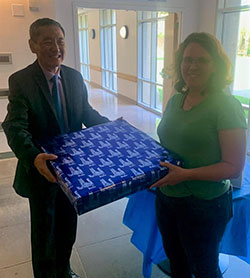Four PhD Graduate Students Celebrate Completing the Program


On Thurs., April 18th, the PhD Graduate Program hosted a Last Day of Class ceremony at MSRB1 celebrating the two of the four students remaining in the area who recently defended their theses: Alexandra "Xanne" Hoyt-Miggelbrink and Michael Sun.
Pathology Department Chairman Jiaoti Huang, MD, PhD, and Director of Graduate Studies Soman Abraham, PhD, honored the students by offering remarks recognizing their accomplishments thus far.
We are proud of our students who completed the program during the 2023-24 academic year and defended their theses:
- Zoe Loh: “Nuclear PTEN Regulates Thymidylate Biosynthesis and Cellular Sensitivity to Antifolate Treatment”
- Alexandra “Xanne” Miggelbrink: “TNFR2 Is a Novel Marker of Exhaustion”
- Jessica Waibl Polania: “Antigen Presentation by Tumor-Associated Macrophages Mediates Progenitor to Terminal Exhaustion Transition in Glioblastoma and Other Solid Tumors”
- Michael Sun: “Developing Strategies to Target Glioblastoma Stemness and Immunosuppression”

Our PhD Graduate program was established in the early 1960s with the goal to train investigators to understand and solve fundamental problems in experimental pathology. Our graduate faculty are united by their pursuit of increased knowledge regarding disease processes, particularly the molecular basis for disease. In this way, departmental researchers can translate experimental findings into improving medical practice.
Since Pathology is the only clinical department at Duke University to award a PhD degree, we offer research faculty from other Clinical Departments the opportunity to join our Graduate Faculty. Thus, our pool of Graduate Faculty originates not only from Pathology but also from the Departments of Surgery, Medicine, Neurosurgery, Pediatrics, Ophthalmology, Radiation Oncology, etc. As a result, our students are exposed to research targeting a broad range of human diseases at the molecular, cellular, tissue, or organismic levels. Research topics covered include cancer biology, vascular biology, genomics, host-pathogen interactions, inflammation, immunology, signal transduction, immunotherapy, and vaccine design. Read more about the program here.